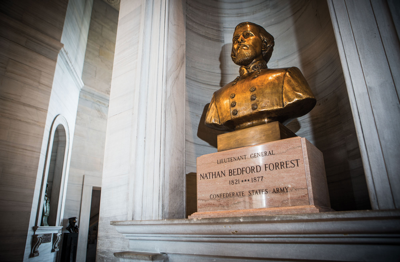
Confederate symbols and statues throughout the South have been coming down in recent weeks — but the bronze bust of Nathan Bedford Forrest remains protected inside the Tennessee State Capitol.
No desire to preserve these statues and monuments as artifacts should trump our desire to respect the rights and honor of all Tennesseans. We should each understand that it is not right to ask Black citizens to accept the presence of the Forrest bust when they come to our Capitol, or to pass a Confederate monument erected during the Jim Crow era as they register to vote, appear in court or serve as jurors.
We debase ourselves when who we honor is not aligned with what we stand for.
On June 9, Tennessee state lawmakers voted against a resolution to remove the Nathan Bedford Forrest bust. But on July 1, Gov. Bill Lee called a meeting of the State Capitol Commission to decide if the bust can go. A decision is expected July 9. I am heartened by the governor’s actions and hope his advocacy causes a change.
There should be no debate over what the “right thing” is regarding these monuments. We cannot change our history by simply eliminating the monuments. But what we can change is our view as it relates to the statues and symbols we’ve been displaying in places of honor. In his recent interview with The Tennessean, Sen. Lamar Alexander said, “It’s always appropriate to review the statues that we have and the places that we named — to see if in the context of today’s times, something would be more appropriate.” He mentioned too that there have been “plenty of wars and plenty of generals since the Civil War, including MacArthur, Patton and Eisenhower,” and perhaps a memorial to one of those men could replace Forrest. I agree.
We will not “erase” our history if we remove or destroy historical monuments or symbols. The removal of any one object, or multiple objects, cannot erase the people who existed or the events that took place. For a certainty, we cannot erase our history from the minds of those whose ancestors still cry out to them for justice. But we can remove the reminders of historical injustice from our cities and marketplaces and courthouses and capitol buildings.
We can also do a better job of teaching our history in schools and universities. Author and civil rights activist Maya Angelou is frequently credited with saying, “You can’t really know where you are going until you know where you have been.” Knowing where we have been and how to change that which no longer works is as crucial as learning reading, writing and arithmetic. Spanish-American philosopher and poet George Santayana once said, “Those who cannot remember the past are condemned to repeat it.” As a nation, we’ve repeatedly made the mistake of not acknowledging what our Black families and friends go through — and in some cases, when we have acknowledged them, we may have assumed things weren’t as bad as they truly were.
When George Floyd was killed in May, it again demonstrated the severe element of discrimination that Black Americans endure — which cannot be denied. Though many of us believe we are not prejudiced and have love for our neighbors without regard to their color, race or ethnicity, there are still many who don’t share our respect. Racism resides in the hearts of far too many, and all too often it still takes precedence over kindness and goodwill.
Oprah Winfrey recently said that “America is at a tipping point,” and she’s right. If we don’t address the pain of the situation right now — if we don’t honor our Black citizens by removing symbols that are reminders of a devastating past — then we are tacitly saying some kinds of dishonor are acceptable. President Barack Obama recently mentioned that he sees the current social and racial awakening as an opportunity. Now is the time to cut through the pretense and take the side of what is right. One step we can take is removing historic monuments and symbols that are offensive not only to our Black citizens and friends, but also to those of us who love and call them friends. Frankly, it should’ve been done long before now.
At the onset of the COVID-19 pandemic, President Donald Trump said it was “no big deal.” Because he set a poor example, many followed suit. If we continue to act like these monuments and symbols of Confederacy are “no big deal,” then many will continue to believe that it’s OK to be insensitive to the pain of our Black residents — those we consider family, friends and neighbors.
We need to take these monuments down. It’s the right and fair thing to do.
Bill Freeman
Bill Freeman is the owner of FW Publishing, the publishing company that produces the Nashville Scene, Nfocus, the Nashville Post and Home Page Media Group in Williamson County.





